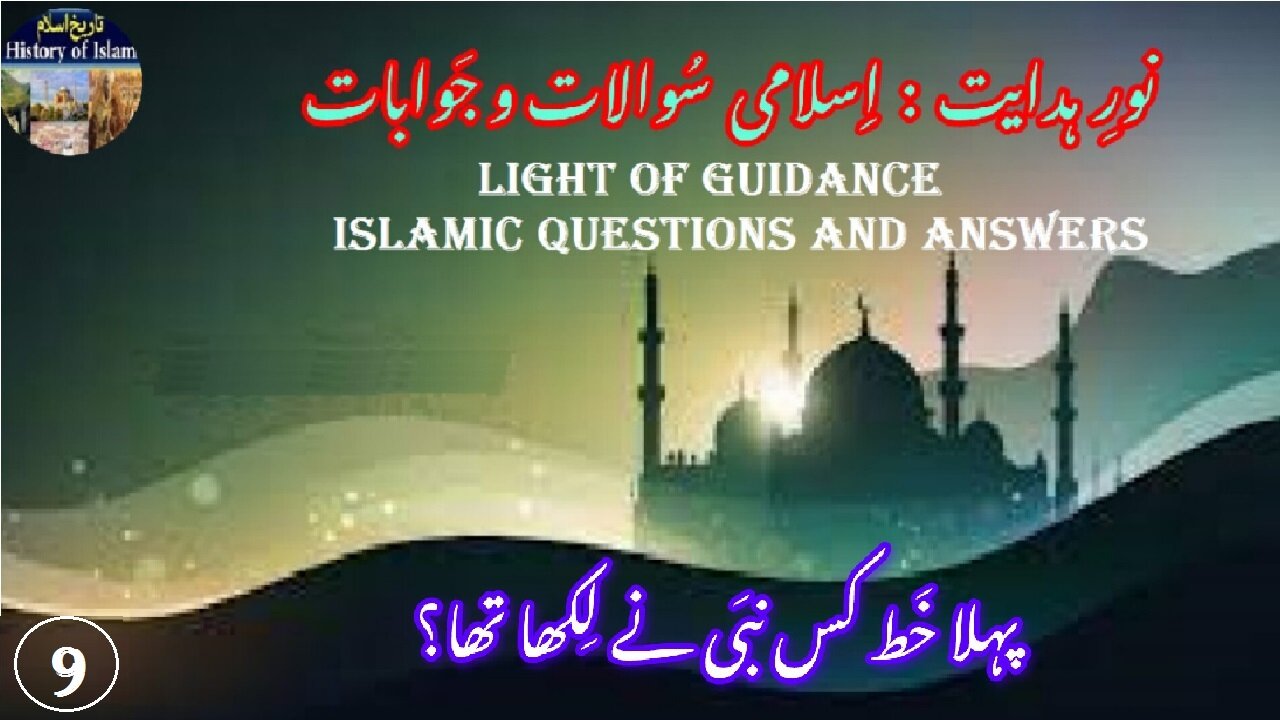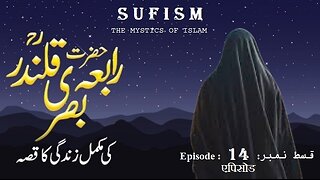Premium Only Content

Which Prophet Wrote the First Letter किस पैगंबर ने पहला पत्र लिखा था کس نبی نے پہلا خط لکھا؟
@islamichistory813 #prophetidris #firstletter #islamicfacts #writingprophet #islamichistory #islamicvideo #quranstory #islamicknowledge #prophetstory #firstwriting #noorehidayat #islamisawalataurjawabat #dailyislamicquestions #quran #authentichadith #islamicseries #islamicknowledgeurdu #lightofguidance #learnislamdaily #quranicwisdom #hadithlessons #islamicguidance #islamicawareness #seektruthinislam #islamic #program2025 #islamicmotivation
Which Prophet Wrote the First Letter?
Assalamu Alaikum wa Rahmatullahi wa Barakatuh, dear viewers.
Welcome to another enlightening episode of your daily Islamic series, “Noor-e-Hidayat: Islami Sawalat aur Jawabat.”
This is the program where we seek knowledge and clarity about Islam through authentic Quranic verses and Hadith.
Today’s important question is: Which Prophet Wrote the First Letter?
Writing is one of the greatest blessings that Allah has bestowed upon humankind. Through writing, knowledge is preserved, guidance is shared, and wisdom is passed from one generation to the next. The art of writing holds a significant place in Islam, as the very first revelation to Prophet Muhammad, peace and blessings be upon him, began with the command “Read.” The Quran says in Surah Al-Alaq, verses 1 to 4, “Read in the name of your Lord who created. Created man from a clot. Read, and your Lord is the Most Generous, who taught by the pen.” This divine verse shows the importance of reading and writing in human civilization.
According to Islamic tradition and the explanations of many early scholars, Prophet Idris (peace be upon him) was the first human being to write with a pen and the first prophet to compose written letters. He is known as Enoch in earlier scriptures, and his story is briefly mentioned in the Quran as a man of great wisdom, patience, and truthfulness. Allah mentions him in Surah Maryam, verse 56 to 57, “And mention in the Book Idris. Indeed, he was a man of truth and a prophet. And We raised him to a high station.”
Prophet Idris lived a few generations after Prophet Adam, peace be upon him, and according to Islamic sources, he was the great-grandfather of Prophet Nuh (Noah). He was one of the earliest prophets sent to guide humanity toward righteousness, worship, and the pursuit of knowledge. Allah blessed him with extraordinary wisdom, insight, and the ability to write — a skill that was not known to people before his time.
It is narrated in Tafsir Ibn Kathir and Al-Bidayah wan Nihayah by Imam Ibn Kathir that Prophet Idris was the first to write with a pen. This is also supported by the writings of Imam Jalaluddin al-Suyuti and Imam al-Qurtubi, who mention that Idris was the first person to use the pen for recording knowledge, crafting letters, and teaching writing to his people. The act of writing was a divine gift given to him by Allah, making him a pioneer of literacy and record-keeping among humankind.
The Quran emphasizes the value of writing and recording information. In Surah Al-Qalam, verse 1, Allah swears by the pen, saying, “Nun. By the pen and what they write.” This shows the greatness and sanctity of the pen as a tool of knowledge and communication. Scholars explain that this verse reflects the same tradition that began with Prophet Idris, who first introduced the use of writing for communication and spreading wisdom.
Prophet Idris not only wrote letters but also recorded important knowledge about astronomy, mathematics, and wisdom. Some classical scholars mention that he wrote letters to guide his people in worship and moral conduct, reminding them to obey Allah and avoid wrongdoing. These early writings were the foundation of recorded human knowledge, and they carried divine guidance for those who lived in his time.
According to Al-Tabari and Ibn Kathir, Prophet Idris was the first to study the movement of stars and the science of numbers. Through his written records, he taught his followers about the laws of nature and the importance of understanding Allah’s creation. This shows that the art of writing was not merely a worldly skill but a means of reflecting upon divine knowledge.
The Prophet Muhammad, peace and blessings be upon him, also highlighted the importance of writing in several Hadith. In Sunan Abu Dawood, Hadith number 3646, it is narrated that the Prophet said, “Bind knowledge by writing it down.” This Hadith emphasizes the same principle that began with Prophet Idris — that knowledge is preserved through writing, ensuring it reaches future generations.
Another related Hadith recorded in **Sahih al-Bukhari, Hadith number 113**, says, “The first thing Allah created was the pen, and He said to it, ‘Write.’ It said, ‘What shall I write?’ He said, ‘Write what will happen until the Day of Judgment.’” This Hadith reveals the spiritual origin of the pen and the divine significance of writing, connecting it back to Allah’s eternal wisdom.
Prophet Idris’s contribution to humanity through writing marked the beginning of civilization’s intellectual and cultural development. He taught people how to use symbols and letters to communicate ideas, preserve revelations, and spread knowledge. By introducing the pen and writing, he laid the foundation for future prophets, scholars, and believers to record divine scripture — including the Torah, the Psalms, the Gospel, and finally, the Holy Quran.
In Surah Al-Alaq, verse 5, Allah says, “He taught man that which he knew not.” This verse perfectly reflects the legacy of Prophet Idris, who taught his people skills and knowledge unknown to them before. His introduction of writing was not only a technological advancement but also a form of worship, as it enabled humanity to record and remember the divine message.
In conclusion, Prophet Idris (peace be upon him) holds the honor of being the first prophet and the first human to write with a pen. Through his wisdom, Allah introduced mankind to the art of writing, a gift that shaped the future of civilization. The Quran and Hadith both emphasize the sacred nature of the pen and written knowledge, reminding believers that writing is a divine trust. The story of Prophet Idris serves as a timeless reminder that learning, writing, and spreading knowledge are acts of worship that bring humanity closer to the Creator. His legacy continues to inspire Muslims to seek knowledge, preserve it through writing, and use it for the betterment of the world.
We pray that Allah Almighty grants us the ability to act upon what we have learned today.
O Allah, increase us in knowledge, faith, and understanding.
O Allah, fill our hearts with Your light and make our deeds a means of Your pleasure. Ameen.
See you tomorrow, Insha’Allah, with another inspiring question and answer in “Noor-e-Hidayat.”
Until then, keep remembering Allah, for indeed, “In the remembrance of Allah do hearts find peace.”
Allah Hafiz
==================================
-
 8:38
8:38
ISLAMIC HISTORY
1 day agoRabia Basri Episode No 14 The Saint of Divine Love” حضرت رابعہ بصری قسط 14 الہی محبت کا ولی
2 -
 LIVE
LIVE
AgnoLand
2 hours ago🔴 SATURDAY NIGHT OPS | BATTLEFIELD 6 LIVE — PRECISION · CONTROL · CHAOS
80 watching -
 4:03:00
4:03:00
TonYGaMinG
5 hours agoARC RAIDERS - DUOS WITH MRR4GER
4.99K -
 1:32:57
1:32:57
Jeff Ahern
4 hours ago $11.37 earnedThe Saturday Show with Jeff Ahern
52.8K24 -
 LIVE
LIVE
Fennis The Gently Devil
2 hours agoTHE BRRRAP PACK: Halo Classic Tournament (commentator's seat)
27 watching -
 9:47
9:47
MattMorseTV
1 day ago $89.03 earnedDemocrats CAUGHT in $15,000,000 LIE.
142K155 -
 1:47:55
1:47:55
Surviving The Survivor: #BestGuests in True Crime
1 day agoDan Markel Murder: Juror from Katie Magbanua's Trial Speaks Out for 1st Time
19K -
 18:03
18:03
stateofdaniel
2 days agoJen Psaki PANICS on Live TV, BACKPEDALS After Smearing Trump with Epstein—Fears LAWSUIT!
26K42 -
 18:31
18:31
Nikko Ortiz
1 day agoKaren You Need A Shower...
44.3K27 -
 1:09:52
1:09:52
VapinGamers
7 hours ago $9.50 earnedTools of the Trade - EP11 Highs and Lows of Streaming with Gothix - !rumbot !music
38.5K2